Transcribed and edited by Nancy Guo
Opening
Damien Venuto: “My name’s Damien Venuto and I’m the host of New Zealand Herald’s Front Page podcast. When I first moved to New Zealand about a decade ago, I distinctly remember an ad campaign that spoke about making this country the most liveable place in the world. At the time, the creative agency behind the ad legitimately believed that we could take steps to become the most liveable place in the world.
But the reality is that that’s not the sense I’m getting in my conversations with people in the studio anymore. It’s easy these days to get a sense that the whole nation is falling to pieces. A quick look at the headlines will reveal stories about ram raids, crime, failing public health and education, and the worst cost of living crisis we’ve ever seen. These are views coming from across the political spectrum. Too many people I talk to everyday acknowledge the fact that these problems were decades in the making and that they will take decades to fix.
The 5 candidates sitting here today are looking to represent Auckland Central, an electorate that is diverse. It covers students, the business community, wineries on Waiheke and those living remotely on Great Barrier Island. When people think of Auckland, this is the electorate they think about, and many of the problems we see across the country, from health woes to inequality, public transport concerns, and the cost of living, can all be found in this community.
It’s easy to point out these problems, the tricky bit is actually offering solutions that can fix them. My hope in this debate is that the candidates spend most of the time talking about what it will take to fix those problems, rather than using the state of the country to score cheap political points against their opponents and how Auckland Central can lead the road on that journey. “
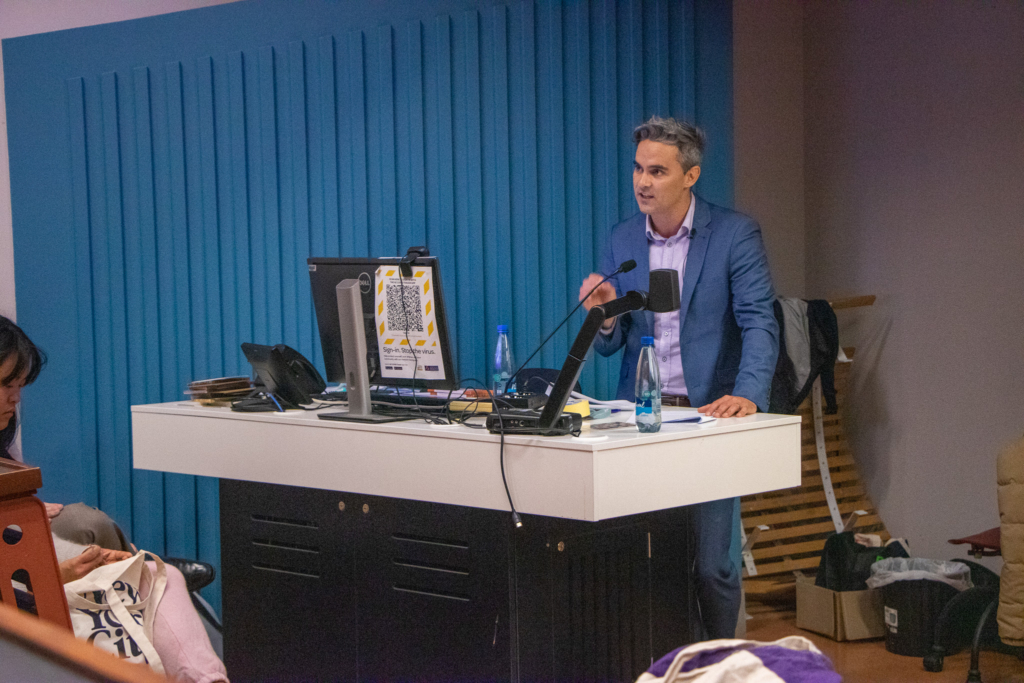
Introductions
Damien Venuto: “To kick off the debate, we’re going to go in order of the latest party polls. To start with, we’ll have the National candidate. Mahesh, you’re in your forties. What are you doing giving up your lucrative job to do this?”
Mahesh Muralidhar: “I’d describe myself as a startup executive, but more than that, I’m a Kiwi who has Indian roots. I came to New Zealand on my own when I was 14 from Singapore. I went to the University of Auckland 25 years ago, where I started the Managing Consulting Club and the StartUp Club. I mentored the Rainbow Business community. But why am I here? Because I love this city. I love this place. This place, this country gave me so much. It’s a dream for me to come back.
Damien Venuto: “One thing that you have spoken about on the campaign trail is New Zealand’s low productivity. If you look at the trends, New Zealand has been lagging behind the OECD since the 1970s. So far, decades of governments have promised to fix this issue. Despite that rhetoric, trends have not changed. What are you going to do differently?”
Mahesh Muralidhar: “Let’s talk about the issue of productivity. In New Zealand, our two biggest economic drivers are tourism and agriculture. We need to identify a third pillar. I spent close to a decade in Australia, where I was one of the first leaders of Canva, which grew from 20 people 10 years ago, to 4,000 people today. I saw the number of jobs that the tech sector built and gave. And I think New Zealand missed the boat in regards to that. But I’m really excited about being part of the change forward and driving that entrepreneurial zeal back into the country.”
Damien Venuto: “Next up we have Labour’s Oscar Sims. Oscar, you’re in your twenties. You could be on your OE seeing the world, but instead you’re here. What’s your motivation?”
Oscar Sims: “Like Mahesh, I love this country. I’m a member of Generation Z. I’m a renter, here in the city centre, just down the road. And I know that there are big challenges facing young people in New Zealand at the moment. Obviously, issues like the cost of living crisis, but I think also broader structural challenges, like housing. This Labour government has changed the game. It changed the conversation on housing from John Key, who over nine years, denied, denied and denied that there was a housing crisis. Labour has made it easier to build houses, and has built more state homes since the 1950s.
More broadly, I love this community and I think that Auckland Central needs a strong voice focused on local issues. There are a lot of people who are here for 8 hours a day and then they leave the city centre. What we need to build in Auckland Central is a sense of community for the people who are here 24 hours a day. That means Neighbourhood Watch, people looking out for one another.”
Damien Venuto: “After the last election, the leaders of the Labour Party brought in big ideas but many analysts have questioned the execution. The TVNZ-RNZ merger, efforts to get the country on board with Three Waters, are just some of the examples where execution would have perhaps been better. More recently, we’ve also seen a messy exodus of ministers. If senior Labour staff can’t be trusted to get things done properly, why should Auckland, our biggest city, trust an untested political newbie?”
Oscar Sims: “I think there’s good reason to bring in fresh blood and for a new generation to be inside the Labour government. I’m not a completely untested political newbie. I have been involved in housing activism over the last couple of years and been deeply involved in this community for a while. Young people, Gen Z, deserve a voice in parliament.”
Damien Venuto: “Next up we have Felix Poole from the Act Party. Felix, you’ve been training to be a lawyer, so you should feel pretty comfortable in a debate setting. What motivates you to be here and put your neck on the line?”
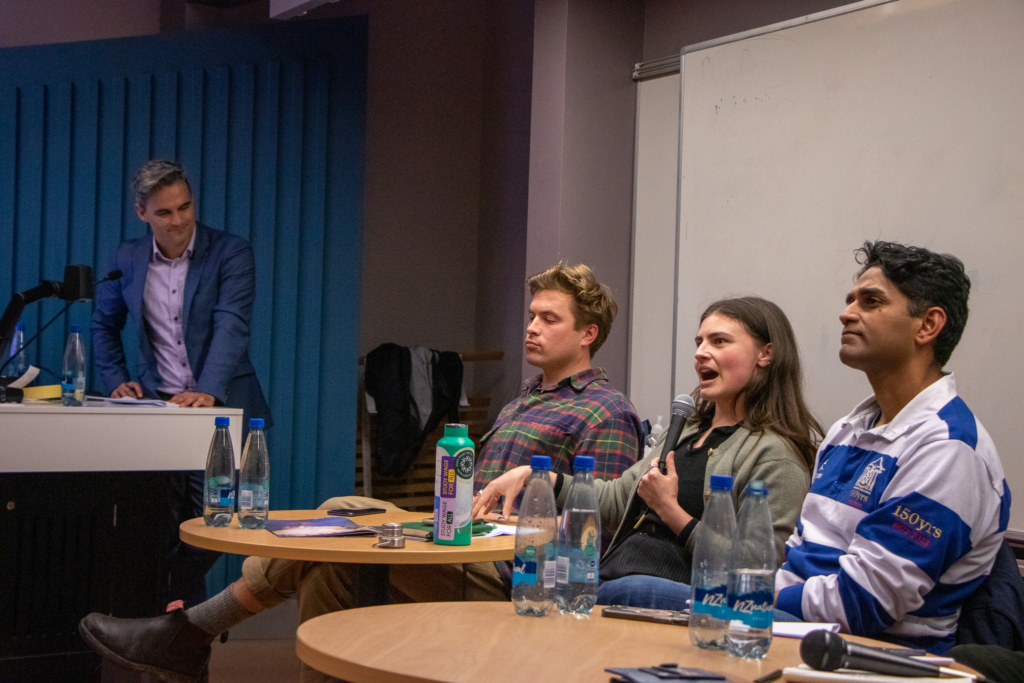
Felix Poole: “What really motivates me to stand and ask people for their party vote are the issues that are facing students right now. Before I started work at a community law centre down in Manukau, I worked at the Auckland University Students Association as a senior advocate. When I was working there and talking to young people, what you really notice is that students are really struggling right now. They’re struggling with the cost of rent, the cost of food, the cost of living. And the way that politics works at university is that every three years, politicians will come here and they’ll promise us everything. They’ll promise to increase student allowance, get down the cost of rent, to give people affordable food.
But the reality is, the Labour-Greens coalition has only delivered an increase in food by 6.5%, transport costs by 14% and an increase in rent by 3% every year, and an overall increase in utilities and household costs by 9%. Five years on from the election of that government, young people aren’t doing any better. So what I’m standing for here is real change. We need to end the wasteful spending. We need to get the government back on track. We need to tackle crime, the cost of living, because we can’t have broken promises anymore.”
Damien Venuto: “Act leader, David Seymour, has called for a referendum on the Treaty of Waitangi. As a young New Zealander, who would’ve spent some time studying the contractual obligations of the Treaty at university, do you think this is a good idea, from a social or legal perspective?”
Felix Poole: “The Treaty of Waitangi is an amazing document. To start a country on a voluntary basis, a contract between two peoples to come together and create a nation, is an amazing thing. The reality is that the Crown hasn’t kept up with some of its obligations. When it comes particularly to property ownership, we haven’t respected Māori property ownership, and that’s why things like the Waitangi Tribunal are quite important.
But what I don’t think that means is looking at public service delivery and saying we need to have separate entities for different people. Under the Treaty, we should treat everyone equally and give everyone equal rights and responsibilities. That’s my understanding of the Treaty and that’s the Act party’s understanding of the Treaty.”
Damien Venuto: “Next up we have Chlöe Swarbrick from the Greens. You’re still in your twenties, but you’re basically the political veteran on this panel. What keeps you motivated?”
Chlöe Swarbrick: “Actually, it’s a lot of the things the others have addressed, but not necessarily gotten into the solutions about. Something which I said in my maiden speech, the first speech you give in Parliament, is that if I can achieve anything in my time in politics, it’s to change people’s perception of what politics is. It’s not the stuff that people in suits do, yelling at each other, but it’s our day-to-day decisions, it’s about resources and it’s about power.
Do not leave politics to the politicians. Much like what Felix was saying, politics doesn’t happen every three years with a general election. It happens every single day with decisions that filter through to our day-to-day lives.
That’s why I’ve been really proud over the last 6 years, but particularly the last 3 years, to have had the privilege of serving my home and community of Auckland Central, and to do that consistently, on-the-ground organising, because Wellington is not coming to save us. Change is not coming from the top down. We have to work together. We have to raise our voices and we have to build the mandate for that change in order to actually make it happen.”
Damien Venuto: “Chlöe, a July poll suggested that 64.5% of New Zealanders felt that the country was heading in the wrong direction. That points to an appetite for change, but one of the biggest concerns I hear when I talk to people on the left is that a vote for the Greens, is a vote for Labour.
Given that you are likely to form a coalition with Labour if provided the opportunity, what would be your response to those concerns and would the Greens be willing to sit on the cross benches if needed?”
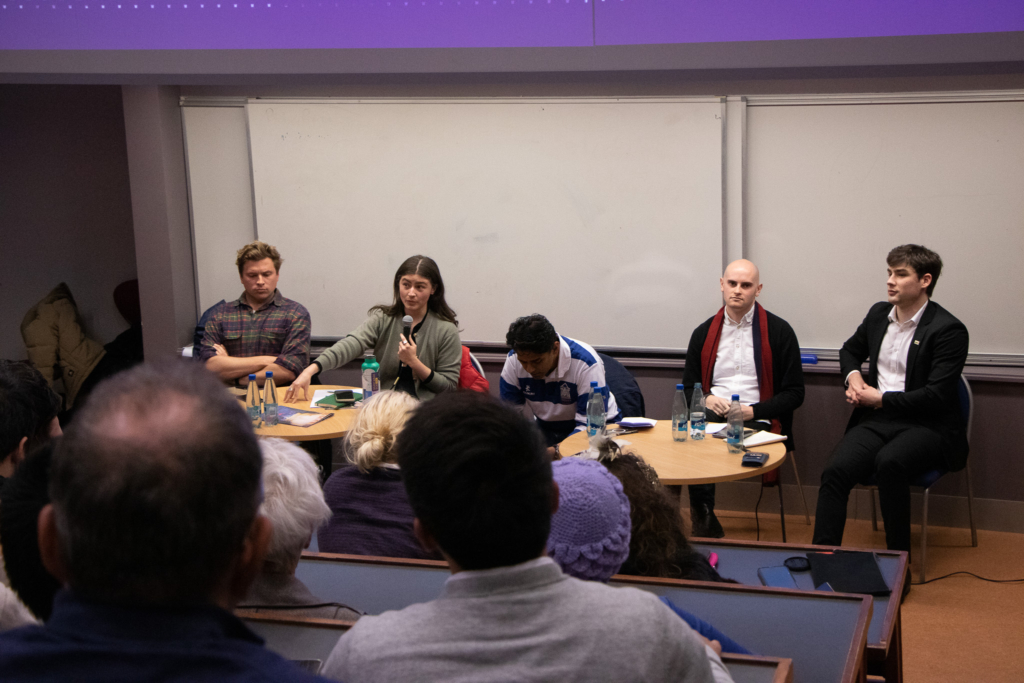
Chlöe Swarbrick: “First thing first, would the Greens be willing to sit on the cross benches if needed? Absolutely. Recently, just as of this past weekend, conducted the internal process to figure out who would be sitting on, which is the group for those who would negotiate, if we’re in the potential position to form a government. I am very privileged to be in that group and I have been consistent in sitting both in and outside governments.
We’ve had arrangements with the Labour Party about what form of government we would take within the executive and how we’ll hold them to account within legislature. To that effect, we absolutely would take any role, in any composition, within Parliament to extract the most policy gains and the most meaningful outcomes for New Zealand.
To the point around ‘a vote for the Greens is a vote for Labour,’ I’d say that the same scrutiny should be applied across the board. Because what we’re also seeing is an Act Party that is proposing some of the most regressive policies that this country has ever seen. The 1980s called and apparently didn’t go far enough. And as far as that’s concerned, a vote for the National Party is a vote for the Act Party and a potential coalition with National.”
Damien Venuto: “Now for the man with the best name on the panel, despite the incorrect spelling, Damien Sycamore from TOP. What brings you to this exchange of ideas?”
Damian Sycamore: “I’m Damien Sycamore and I’m running for Auckland Central for The Opportunities Party. The Opportunities Party is here to change the way New Zealand approaches housing. You will note that everyone here has talked about unaffordable housing or unaffordable rents. And so far over the last 40 years, no political party has had the gumption or technique to actually propose significant change to alter the way that it’s treated.
Nothing changes, if nothing changes. The Opportunities Party has a plan to improve affordability. That’s why I’m here. I’ve got a three year old son. I bought a house in 2019. It’s taken three, almost four years of my life just to make it livable. And I’ve got some bad news for all of you guys, it’s gonna be even harder, unless something changes.”
Damien Venuto: “So, TOP has tried a few times to get into Parliament, but has failed, despite huge investment from the likes of Gareth Morgan. What do you say to those who suggest that a vote for TOP is a waste of a vote?”
Damian Sycamore: “This comes up a lot. You can’t waste your vote. The only way you can waste your vote is by not voting. You vote in accordance with your principles and what you want the country to look like in the future. It is difficult in the current MMP setting to achieve the 5% threshold, which was put in place quite a long time ago before we had as much of a plurality of voices as we have now in the political landscape.
I’m not suggesting that the Parliament should be radically overhauled, but certainly the 5% threshold makes it extremely difficult for a new party to crack in. In fact, it’s never been done before. The only way a new party has come through is by an MP waka jumping. That’s the only way it’s ever been done before.
The consistency of TOP’s message that New Zealand needs to sever the link between investment and property has remained, and it’s only gotten worse. Everyone keeps talking about productivity, why aren’t we more productive? The reason we’re not more productive in New Zealand is because we tip all of our money into property, which is as unproductive as it gets. We need to change that and currently TOP, with the potential exception of Chlöe and the Greens, is the only party with a comprehensive plan to get that done.”
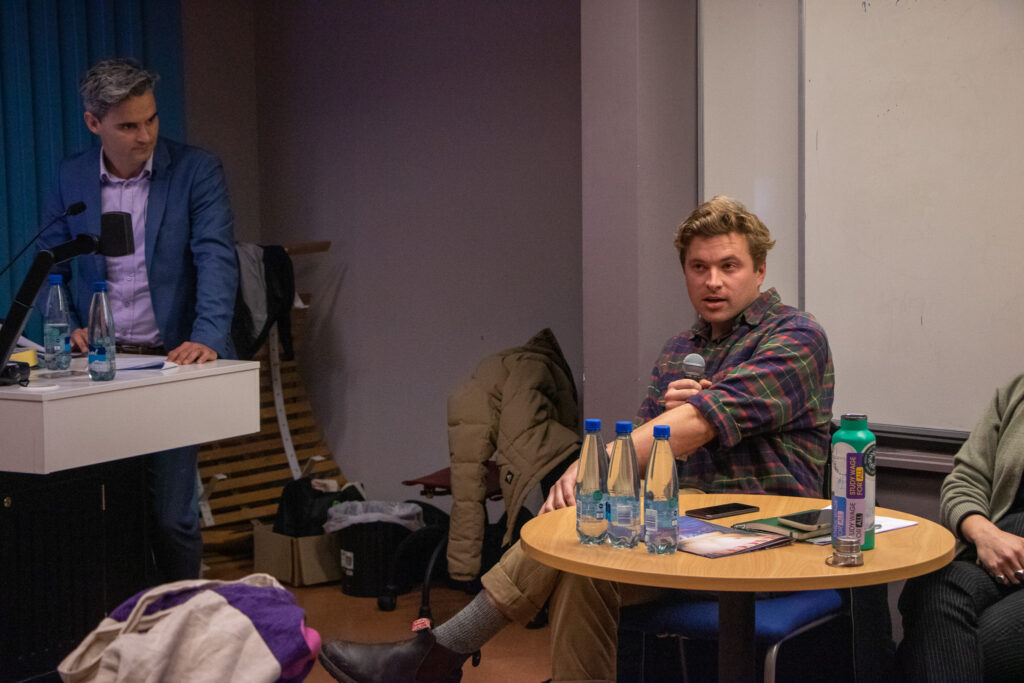
Crime
Damien Venuto: “This leads into the next section. From crime to public transport, Auckland is facing some big challenges in this election. Following New Zealand Police data collected in 2023, Auckland saw large increases in burglary and theft.
Oscar, what do you think is the cause of this?”
Oscar Sims: “Covid mostly. I live in the city centre and I’ve seen this community change. Things have become a lot worse over Covid but they have started to get better. What I would say is look at National’s record. The Fort street police station closed under their government. Labour has put funding into the police, and we are working on the complicated structural problems that are the drivers of crime.
Anyone who is going to sell you a simple fix, or a quick trick, to end crime forever are lying to you. Things need to get better, and they need to get better quicker. That is a priority for me.”
Damien Venuto: “Does anyone on the panel want to respond to that?”
Damian Sycamore: “A quick question for the panel. Do you have a warm, dry and affordable house to live in? If yes, do you commit crime?
If you don’t have a place to call home, it is difficult to participate in society. There isn’t a short term fix for the issues that New Zealand is currently going through. But one of the things that we need to do most urgently is to make sure that we’re providing affordable, warm, dry housing to as many people as we can. It’s a human right. “
Damien Venuto: “Mahesh, the National Party has been going hard on the issue of crime. National has called for harsher penalties for offenders, despite the fact that every criminologist that we’ve spoken to on the Front Page podcast has said over and over again that harsher penalties do not deter crime, and in fact, can have the opposite effect.
Why are these experts wrong and why is National going in a different route?”
Mahesh Muralidhar: “Law and order’s main objective is to make sure that people feel safe. The current Labour government has focused on just one metric, their primary metric has been to reduce the number of prisoners. Covid has played its part, and there are also deeper socio-economic issues, but when we have not empowered our police system and our justice system to function properly, this has led to law and order breaking out.
The number of businesses and residents that are struggling because of this is not okay. From a short term perspective, we need to make sure that we arm the police and the justice system with the right instruments to make sure that people are kept safe. We need to invest into long-term, strategic initiatives to make sure that rehab works and that people have the opportunity to get back into society.”
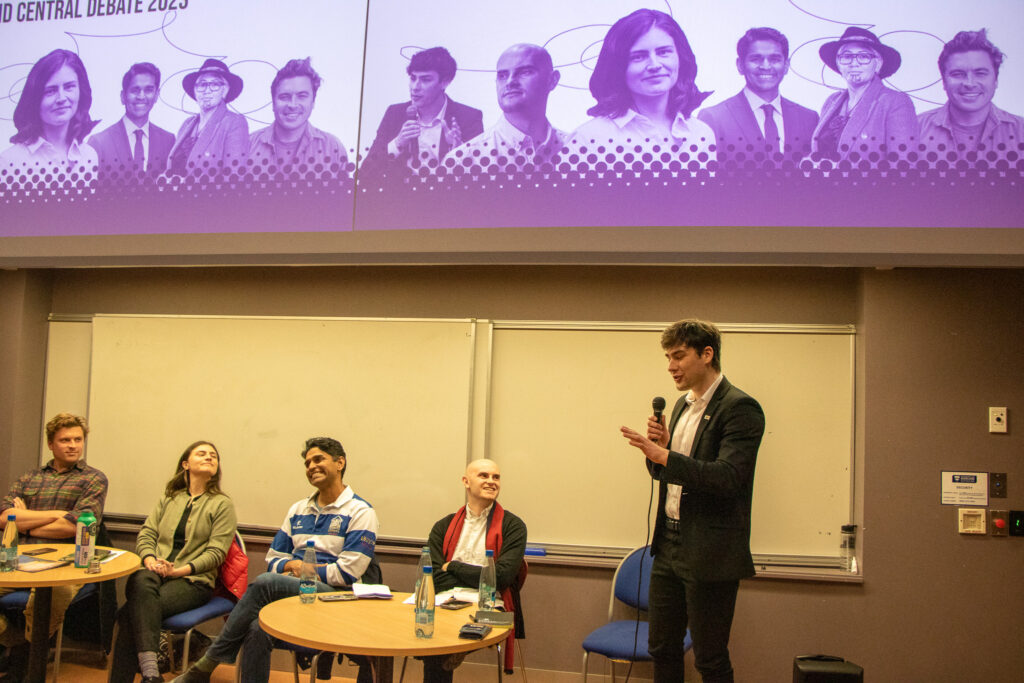
Damien Venuto: “Would anyone on the panel like to respond to what Mahesh said?”
Chlöe Swarbrick: “Everyone is entitled to and should feel safe, but the responsibility of politicians is not to meet that anxiety with soundbite solutions, that we know demonstrably, and the evidence indicates, does not work. Our responsibility is to live up to that evidence, to advocate for, and to implement, evidence-based policies.
We’ve had successive governments commission reports on this issue and then ignore all of the outcomes and recommendations made in those reports because it’s seen as too hard-basket and too expensive. But it costs approximately 200,000 dollars per year to put somebody in prison. There are far, far better uses for that money.
The problem is that we do not view crime from a prevention perspective. We know, for a fact, and I’ve been out there with them, that the issues the police are dealing with are in regard to mental health, particularly alcohol consumption. They are saying time and time again that they cannot deal with the avalanche of social issues in Auckland. The best option they have is to lock people up for a night and then put them back out on the street, just for people to end up in prison further down the track. Yet we know that the longer people spend in prison, the more likely they are to re-offend.
Fundamentally, solving the issue of crime comes down to ensuring that we have a strong and resilient community, and that we’re able to be the eyes and ears for each other. That is the best way that we’re able to identify the issues that people are experiencing. Provide them with the help and support, like Damian has been speaking about, to prevent things from escalating.”
Damien Venuto: “If politicians don’t put enough resources into fixing the community and social problems that lead to crime, which has been a problem for decades, what are we meant to do in the community? What are members of the community meant to hope for?”
Chlöe Swarbrick: “Replace the politicians.”
Damian Sycamore: “While Chlöe and Oscar have talked about creating a community, it’s hard to do that at the moment because the community is struggling. There’s a deprivation that has crept into this country. House prices, certainly affordability, have continued to take up more and more of people’s take home pay. People’s capacity to be compassionate and contribute to the community is being eroded at the same time as their ability to just pay the bills.”
Damien Venuto: “While our focus on crime seems to be on ram raids and burglaries, one of our biggest crime problems goes largely unseen. Police attend to more than 130,000 instances of family violence every single year. Let that sink in. Yet, we haven’t seen any politicians jump up and down and scream about the problem of family violence.”
Chlöe Swarbrick: “For the first time in the last term of this government, we have worked to create the undersecretary role to the Minister of Justice, which focuses on ending domestic and sexual violence. But to the point that you brought up, this stuff is not going to be turned around overnight. There is a substantive connection here to ram raids. National police headquarters have produced a phenomenal amount of research on the most egregious youth offenders and ram raids. They found that 95% of those kids have been subjected to a family harm call-out in the past 6 months.”
Damien Venuto: “What is Act’s position on family violence?”
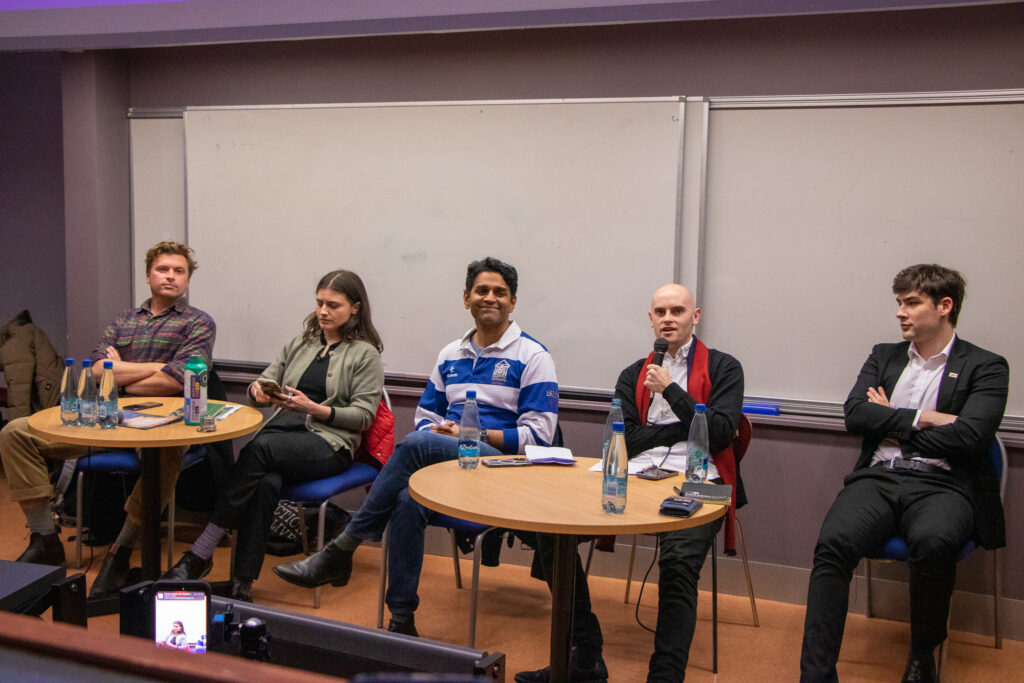
Felix Poole: “Act’s position on family violence is that all crimes should be dealt with and prosecuted. We need to take that seriously. We need to fund the police to make sure that we’re responding as quickly as possible to instances where that arises.
In terms of crime, it’s very obvious that crime is driven by economic issues. It’s driven by economic deprivation, it’s driven by the breakup of communities. But at the end of the day, when crime goes up, as it has under this Labour government, there still needs to be a police response. There still needs to be a justice response that makes people feel safe, that ensures people aren’t being harmed in our communities.
Since 2017, violent crime has gone up by 31% and knife crime has gone up by 20%. In the last 2 years, ram raids have gone up by 500%. People right now in Auckland Central don’t feel safe. Labour’s response in 2022 was to gaslight the public into thinking that ram raids haven’t gone up, and when it became apparent that they were going up, they decided that they would just distribute fog cans.
We need a multifaceted approach to crime and justice where we change the sentencing dynamics, fund the police and introduce actual resources for Corrections for them to take care of prisoners, house more people, and to actually rehabilitate people. Communities are one part of the solution, but we still need a justice policy.
Oscar Sims: “But the Act Party wants to repeal the gun register, after a spike of incidents of gun crime in the city centre.”
Felix Poole: “The Labour government has introduced a multitude of laws and regulations around gun crime, but gun crime has gone up. One of the main reasons that Act wants to repeal the gun register is because information from this register has been repeatedly leaked to the public. And the worry is that when it gets leaked, gangs will come in and steal guns from people on the register. Just a couple of weeks ago, a few thousand people’s names and information was released. It’s very sensible to say that if we can’t trust the data security of a gun register to actually keep that information safe, then it’s something we need to get rid of.”
Mahesh Muralidhar: “Let’s be very clear, Auckland Central is not safe. Any politician that doesn’t acknowledge or accept that reality can’t even begin to solve the problem. One of the things I’m excited about is the social investment programme that the National Party is going to put forward. The government doesn’t have all the answers, but the community is critical.It’s not about centralising all the answers and all the solutions, we have to trust our community. We have to invest into people who are actually solving problems and set up a new wave of social entrepreneurs who can help our kids and people who are struggling.”
Public Transport
Damien Venuto: “A big talking point in Auckland right now is transport. Damien, why do you support the Auckland Light Rail?”
Damian Sycamore: “I’ve caught 4 buses today. I prefer trains.”
Chlöe Swarbrick: “First things first, I also love a train. Secondly, if we are to grow as a city, we have to invest in our public transport infrastructure. I’ve got mates who have gone over to Australia and Europe, and developed public transport infrastructure are precisely the trademarks that encourage people to choose to live in those places.
We also know that congestion costs us approximately 1.25 billion dollars a year in this city alone. We need to bust that congestion and in regards to the Auckland Light Rail, I do not for the life of me understand how we are trapped in this peculiar debate where the only way to progress and build meaningful public transport is to do this massive, billion dollar infrastructural project of the Light Rail, or keep the status quo.
There’s ways to do it faster, like through creating Rapid Transit Networks. If we deploy buses along those routes and reallocate road space, we can get more out of the infrastructure that we already have and have a far more efficient public transport system.”
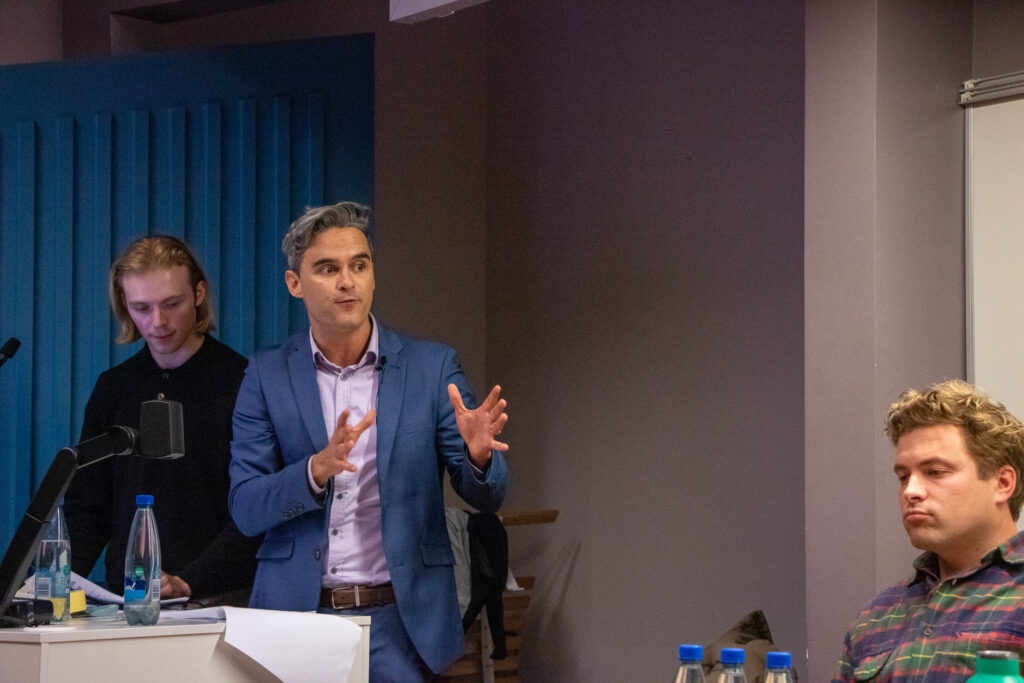
Oscar Sims: “There seems to be a bit of competition about who likes trains the most. Currently, they’re writing Wikipedia articles in case me or Mahesh wins. For my personal life section, the only thing they’ve got written is that ‘he has an interest in trains.’ So that should show you my commitment to public transport. I have never owned a car. I take public transport everywhere. For Auckland Central, it is the community with the lowest car trip rates in the country. Public transport is absolutely key for people who live here to get around and get to places. “
Felix Poole: “The Auckland Light Rail is a complete waste of money. It’s a terrible project that’s not worth it. There are way better things we can invest in if we actually want to advance public transport.
The issue with public transport has always been the issue of cost and funding. Countries with a big tax base, like Australia, can afford really good public transport. Auckland doesn’t have that big of a tax base. The cost of the Auckland Light Rail is out of proportion with the funds we have in the city. If we want to build more public transport, we need to do congestion charging to raise funds. We need to have toll roads and public-private partnerships to build more infrastructure.
Look, that’s what the reality is. We only have so much money to spend as a country and we can only take so much money from the taxpayer. If private clients are willing to give money to the government to build infrastructure, I think that’s a very good idea.”
Chlöe Swarbrick: “If we want to bring Australia into the debate, Australia has a higher top tax rate on income tax. They also have a capital gains tax.”
Felix Poole: “Australia also has tons of iron ore and coal coming out of the ground every year, which they send to China, pouring billions of dollars into their economy. But I’m pretty sure Chlöe doesn’t support that.”
Chlöe Swarbrick: “Under the former National government, we had the implementation of the Public Transport Operating Model, which requires Auckland Transport, through Auckland Council, to contract out the provision of what is ostensibly, our public transport. Somebody is clipping the ticket and making profit, while our services are not delivering.
The point of public goods is that they’re supposed to be in the public interest. They become all the more inefficient and expensive when they are privatised, and that’s what the Act party is advocating for.”
Felix Poole: “The government inevitably comes under the crunch because of the recession, which means that all public transport is going to be downgraded. Part of the benefit of having private-public partnerships is that those private companies can foot the bill for paying for some of that public transport.”
Damien Venuto: “The debate between the Light Rail and building more roads, what’s your position on that, Mahesh?”
Mahesh Muralidhar: “New Zealand is so far behind in terms of infrastructure. We need to build roads. We need public transport. But we need to do this in a responsible way. We are getting poorer as a country, and as much as the wealth tax is an easy thing to throw out, the evidence shows that when a wealth tax has been introduced in the vast majority of countries, the countries get poorer.
We need to take a step-by-step approach in regards to improving transport. First, we get some roads going, we get the economy pumping, and then invest into a fantastic mass rapid transit system that we’ll be proud of.“

Economy
Damien Venuto: “Top of mind, for most people right now, is the cost of living crisis. We are in a room of students and it’s well documented that tertiary student poverty is a significant issue.
Mahesh, since you are against the idea of forgiving student debt, what will you do to resolve the issue of student poverty?”
Mahesh Muralidhar: “We need to make sure that we have better and high income jobs in this country. Today at the bus stop I had a conversation with a Greens supporter, who talked about how she’s really struggling financially. But over the last 6 months, she’s doing so much better because she’s now working virtually for an Australian company who’s paying her a higher salary. That’s what we need to do. We need to make sure that high income jobs are accessible for all of you, that your counterparts across the ditch have access to. We can make that change.
Damien Venuto: “The Opportunities Party has launched a major campaign over the last week that affects people under thirty. Could you talk about what you are planning?”
Damian Sycamore: “The Teal Card. Everyone knows the Gold Card. The Gold Card was good, but the Teal Card is better. You guys that are coming through have got so many intractable issues to deal with, the least that New Zealand can do is make sure that your formative years, and your early adulthood, is easier than it currently is. Free transport, five free GP visits a year, free mental health services for anyone under 30.
There’s also a civic community encouragement course, which sounds like shit, but it’s actually really great. It’s all about bringing people from diverse parts of the country together so that we can actually understand each other instead of continuing to swim in the same cohort, where we become fearful of each other. The sooner New Zealand starts cross pollinating, the earlier that we can start to get lots of different people from different schools to talk about the future of the country.”
Damien Venuto: “Data from last week showed that we had our biggest net migration of New Zealanders in a decade, with 34,000 people leaving the country. Felix, you are the youngest member on this panel. Why do you think it is that young people are leaving and what will Act do to stop it?”
Felix Poole: “The reason why young people are leaving to Australia is very simple. The median wage in New Zealand is 26 dollars an hour and the median wage in Australia is 37 dollars an hour. People are leaving this country because you get paid more for the same job in Australia.
The reality is, we need to make New Zealand a productive country. A country that has an economy that works for people, that actually pays people the money they deserve for the hours they work. But we can’t get there if the government continues to take money from us and then spend it wastefully on projects that don’t work, or don’t provide real services to people.
What the Act party says we need to do is to end the wasteful spending. That way, we can give money back to people, they can earn more and we can get this country back on track.”
Damien Venuto: “Chlöe, much of the economy is based on the mood of the market, and this is often informed by the media and politicians. My question to you is whether politicians and the media need to be careful about painting such a negative picture, so that it almost becomes a self-fulfilling prophecy in terms of business confidence.”
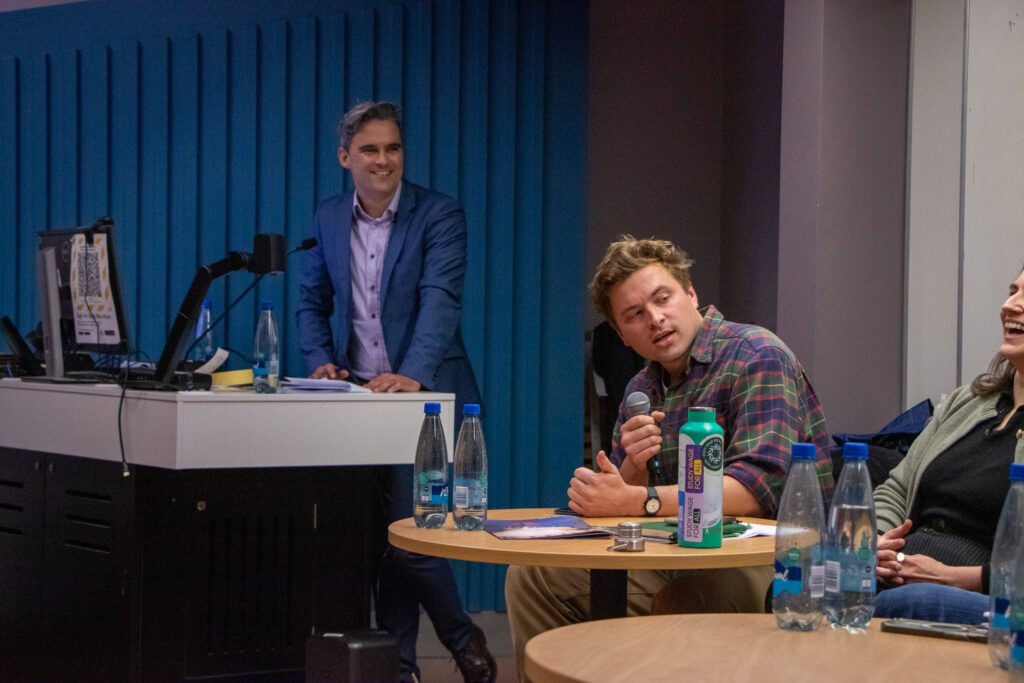
Chlöe Swarbrick: “When it comes to how politicians and media commentators engage in informing public narrative, there is an absolute outright responsibility to do so with care grounded on the evidence. There is the opportunity to inform the way that people think and feel about things, therefore the way that they behave can become a self-fulfilling prophecy.
Just to the point that Felix was making before about Australia, the point needs to be made again that Australia has a higher top income tax and they have a capital gains tax. The other point that needs to be made, as Damian’s been speaking to, is that we have an economy that has largely been geared around looking like a game of monopoly.
Monopoly was invented to teach young people about the pitfalls of an economy that is premised on land speculation. What we have in this country is a distorted economy because of the way that we treat tax, particularly on land and on property.
Based on a pure reading of the Income Tax Act, you should be taxing the capital gains from property. That’s the reason that the Bright-Line test was introduced under the former National government because the IRD were saying that these are the distortions being introduced into the tax system. Unless and until we grapple with that issue, we will continue to see distortions. The IRD and the Treasury’s research, released at the beginning of this year, told us that the top 311 families in this country hold 85 billion dollars of wealth combined.
That is not an accident. It is a logical consequence of a tax system that sees the top end of town paying a tax rate that is less than half of the average New Zealander. All of this stuff is connected and it’s why it comes back to tax.”
Felix Poole: “We can’t solve our problems just by taxing people. When you tax people, they leave. I just want to talk about the Greens’ wealth tax because I think it’s a ridiculous policy. There’s 3 reasons why the wealth tax would be extremely damaging to the New Zealand economy.
The first reason is that 62% of people’s wealth is non-financial. If we implement a wealth tax, everyone’s wealth will have to be valued every year by the government in order to tax it. Things like the wealth tax, or land tax, have huge compliance costs to the government. So the tax you get, in terms of efficiency, isn’t actually very good. But the biggest problem with raising taxes on wealthy people, or anyone in general, is that you get capital flight.”
Damien Venuto: “Felix, I’ll stop you right there. Where are they going to go? Because almost every country has a capital gains tax.”
Felix Poole: “I would say that the Greens’ wealth tax of 2.5% is far more aggressive than a capital gains tax. The wealth tax taxes regardless of whether you are selling or not. If you’re a rich person, and the Greens implement a wealth tax, you’ll just go to Australia.”
Damien Venuto: “We will now pass to Mashesh, because my guess is that he has got first hand experience working in some high risk industries and seen the impact of recessionary decline and tough economic periods.
Could you give us a sense of how concerned you are about the upcoming recession and the Reserve Bank’s suggestion that we need to see the unemployment rate go up in order to get on top of inflation?”
Mahesh Muralidhar: “There’s been discussion around evidence-based politics right? Every country, nearly every country that has introduced a wealth tax has walked away from it because of the points that Felix made. If we were to roll out the wealth tax that the Greens have suggested, it would destroy the economy of this country. People would leave in droves. The entrepreneurial zeal that we talked about, it will leave. Capital won’t come into the country. Foreign direct investment will go away. Then the desires that we have in regards to investing into housing, into education, into making sure that all of you have great high paying jobs, will go away. “
Damien Venuto: “I’m going to get Chlöe to respond to that and then we’re going to move on.”
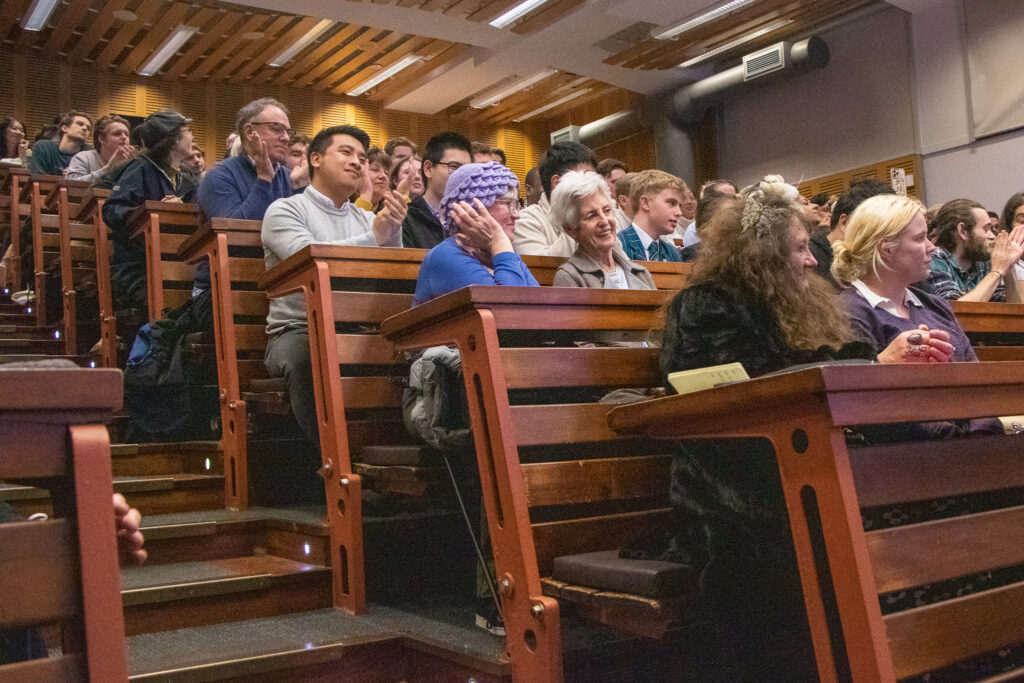
Chlöe Swarbrick: “We hear the economy often being used as an excuse for why we can’t do certain things, for example, to provide free public education. The economy is all of us. It is the stuff that we create and it is the rules that we put in place to incentivise and to dis-incentivise certain types of behaviour.
Let’s talk about the tax distortions that have been raised by both the National and the Act Party. Currently, we have a piece of legislation passing through the house called the Tax Principles Bill that mandates 7 different things that the government and the IRD need to be paying attention to, and reporting on, with regards to the fairness of our tax system.
I sit on the Finance and Expenditure select committee, and within that committee, there was consensus from every political party about those principles to be measured against. But guess what? They’re voting against the bill because they don’t want to see that data collected and published because doing so would enable all of you to see just how distorted the tax system and the economy is. If you’re not willing to engage in putting that evidence on the table in the first place, I don’t think that you are interested in having a meaningful conversation about how to fix this economy in the first place.”
Climate Change
Damien Venuto: “After Cyclone Gabrielle hit, there was a lot of hope that climate change would become the front and centre of the debate leading up to this election. But that hasn’t been the case at all.
Mahesh, National has proposed putting 20 billion dollars towards building new roads. Are more roads really the best answer to the climate crisis?”
Mahesh Muralidhar: “Those are two separate things. In regards to climate change, we need to work on climate mitigation. We need to be part of the global climate solution. How do we do that? We need to make sure more and more of our energy is renewable. National has come up with policy that will make sure that renewable energy infrastructure comes out faster and cheaper. We will work in partnership with the private sector and communities to get things going.
Secondly, we need to make sure that we are a green tech hub for the world. We should be ensuring that more and more entrepreneurs come into this country and produce great companies that actually make a dent.”
Damien Venuto: “Chlöe, the Greens take a slightly different perspective don’t they?”
Chlöe Swarbrick: “They’re totally connected. Transport is the fastest growing emissions profile nationally, and it’s the largest emissions profile for us in the city. They are absolutely intrinsically linked. If you look at the development of Auckland over the past few decades, what we’ve seen is one of the largest cities in the world, land mass wise. There’s been a concerted effort to sprawl out because we haven’t had the politically necessary conversations about density and density done well.
Ultimately, we have to look at doing housing properly, which is deeply interconnected to wellbeing as well, which is also connected to how people get around and move within our cities. If we are to tackle the issue of transport, then we can alleviate some of the stress on the other emissions profiles that we have.”
Damien Venuto: “Oscar, when I finally spoke to Auckland Council about the time it took to finally build the City Rail Link, Chris Darby described it as taking a hundred years from when the idea was initially mentioned, to when it was executed. He described the process of political and partisan bickering as a disease that stifles progress, infrastructure and the whole country.
Given that context, what do you think it’ll take for politicians to reach a consensus on an issue as big and as important as climate change?”
Oscar Sims: “That project had a significant local government component to it. It was initiated under Len Brown and we’ve had politicians who’ve scapegoated the local government to advance their own political agenda. For example when the National Party rose to power in 2008, they did not support the City Rail Link, before doing a flip-flop on it when they realised that it was popular in Auckland. That sort of thing stops us from building infrastructure and getting projects over the line.
We have to agree on transport policy and make transport policy that works for everyone. I’m an engineer and I think we need more people with technical backgrounds in Parliament. We need more people who know how to build big projects. “
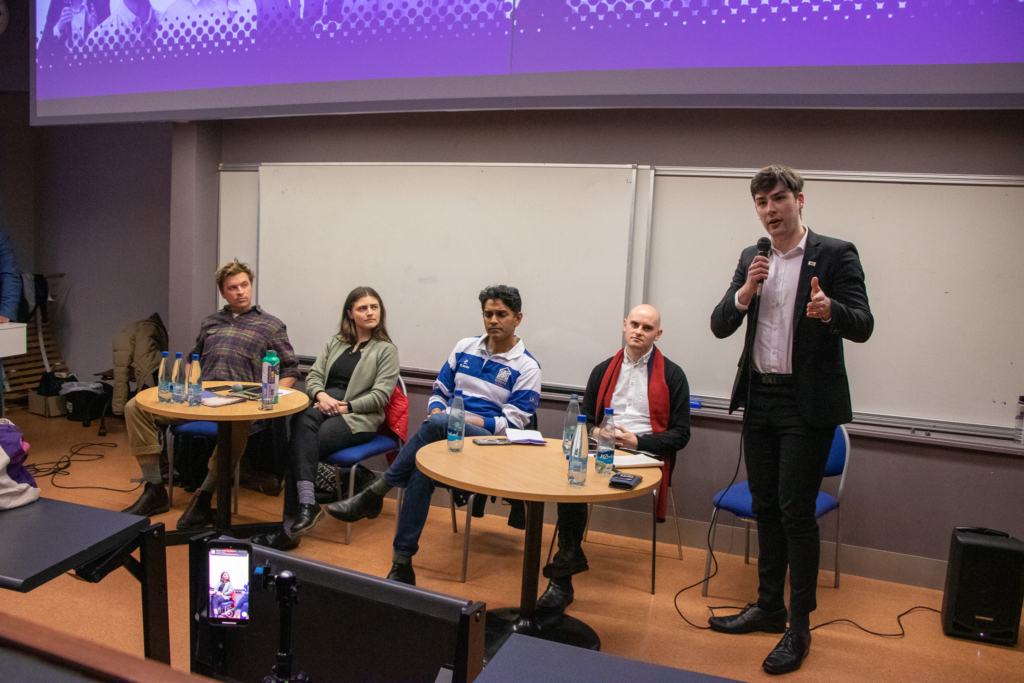
Member’s Bill
Damien Venuto: “If you were elected, what would be the focus of your Members’ Bill? What would you be willing to fight for and walk across the aisle to get consensus on?”
Mahesh Muralidhar: “Straight off the top of my head, it would be creating a common understanding. Making sure that there is a programme for a common understanding across generations and across the country, in regards to our history.
That’s one of the most challenging things for us as a country right now. We all have a common identity around being a compassionate Kiwi, but we have 2 different interpretations of our history. We need to get on the same page in regards to who we are and where we came from, so that this social tension we are going through goes away.”
Oscar Sims: “One of the reasons why I’m standing is that I am one of 40,000 people living in Auckland’s city centre and our issues have not been adequately represented in Parliament. We need strong representation for the city centre because it’s the largest residential neighbourhood in the country.
A couple ideas I have include something around pets and apartments, noise abatement and giving local government more powers to deal with noise issues. I don’t have a drafted bill for you this evening, but these are some of the things I’m thinking about.
Felix Poole: “One thing that Covid has revealed is that our healthcare system is really struggling right now. There’s so many things in our healthcare system that need to be reformed but to speak to one policy area that I would like to see change, and be involved in, is reforming the regulations around the Medical Council, so we can get more doctors from overseas in our country, practising in our hospitals.
That would provide better healthcare for so many people. When you go to a hospital, or the emergency department, the waitlists are ridiculous. People are sitting there in all sorts of states waiting to see a doctor. I think that’s an area of concern that is really important, especially for Auckland Central. If you go to the Auckland Hospital emergency department on Sunday nights, it’s a terrible sight to see sometimes. Getting more doctors into New Zealand, for me, is really important.”
Chlöe Swarbrick: “The bill I have currently in the tin is about rental warrant and fitness. Auckland Central has the highest proportion of renters in the entire country. It’s a real issue for people here. We also know that based on the implementation of Healthy Home Standards, while that’s made some improvements, the government currently has no idea how many homes in the private market are compliant with the Healthy Home Standards. And it has no idea how many companies are currently holding themselves as capable of verifying those Healthy Home Standards. There’s been some very encouraging discussions with Auckland Property Investors Association on potential support for this.
The Election Access Fund Act is something that I supported across the aisle. It’s a fund for candidates with disabilities to be able to remove the barriers that able-bodied candidates do not face in politics. I’ve worked with Nick Smith on a number of the barriers, challenges and presumptions about how that may operate. It means that in this election, candidates with disabilities are able to access that fund for the first time, which is administered by the Electoral Commission.
The third thing is, to the point that Oscar made around Auckland’s city centre, it’s not the sexy stuff that makes headlines. I worked on the Unit Titles Amendment act to improve transparency for those who are buying apartments. “
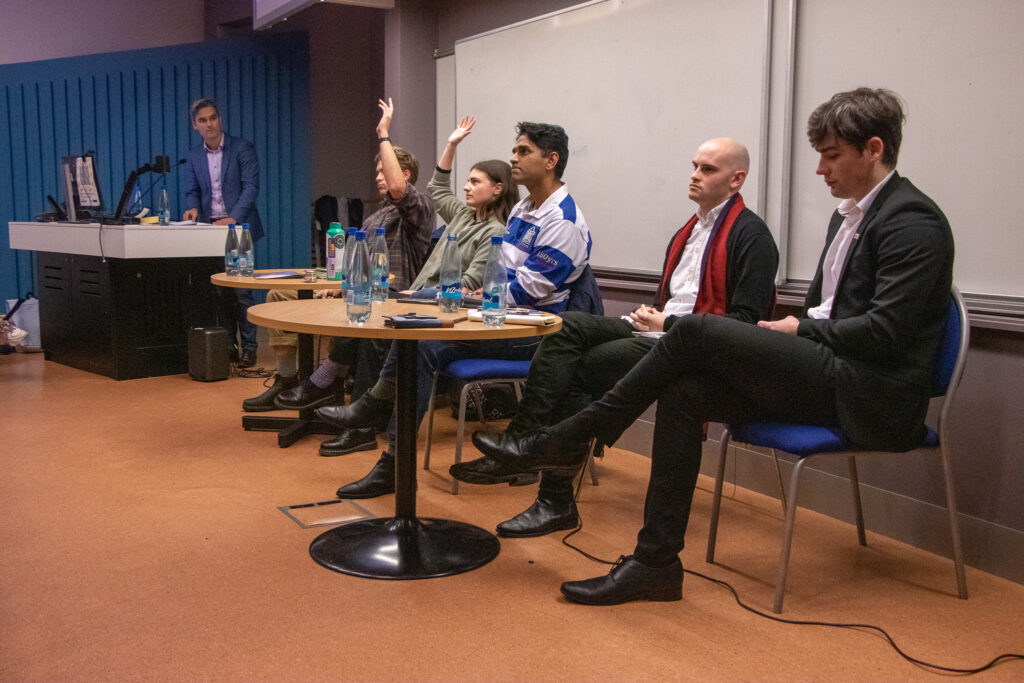
Damian Sycamore: “The only thing that I really care about, and the thing that the Opportunities Party cares most about is affordable housing. The only thing I would be jumping up and down about is a land value tax. I’m not expecting to get into Parliament, I actually want you to vote for Chlöe, but do consider voting for the Opportunities Party for your party vote seriously.
A land value tax would, from a consensus perspective, tick some pretty significant boxes. For one, it’s very difficult for land to move to Australia. Labour also wants more affordable housing, this would make it happen overnight. Mahesh, your point about national productivity, putting more investment into productive assets can help you with that. And from the Greens’ perspective, there is a need to maintain a cohesive society and broaden our tax base, which I was surprised to hear Felix championing earlier tonight.
We can’t continue to rely on income tax and sales tax, which hits the poor hardest to fund 90% of our central government. A land value tax would change the dynamics of New Zealand for good.”
Audience Questions
Audience Member: “My question to each of you is what do you think about raising the tax threshold at the moment?”
Chlöe Swarbrick: “You’ve been reading our policy. The specific breakdown of our tax policy is in our manifesto.”
Damian Sycamore: “We would implement a 15,000 tax free threshold.”
Mahesh Muralidhar: “The idea of making the current first tax bracket tax-free is definitely an interesting one that we should consider.”
Oscar Sims: “The thing about progressive income taxes is that everybody pays the low rate and then you pay the upper ones, depending on how much money you make. It costs a lot of money and what we’re saying in this election is that we don’t want to cut services.”
Felix Poole: “In Act’s Alternative Budget, we have a tax policy that would give everyone a tax cut.”
Audience Member: “I’m a first year student and I have a question about halls pricing. For example, last year it cost 435 bucks for a standard room and this year it was 470 bucks. Next year it will be 500 dollars. A student is not going to make anywhere near that much to support the cost, what will you guys do? This is mainly directed to Chlöe and Mahesh.”
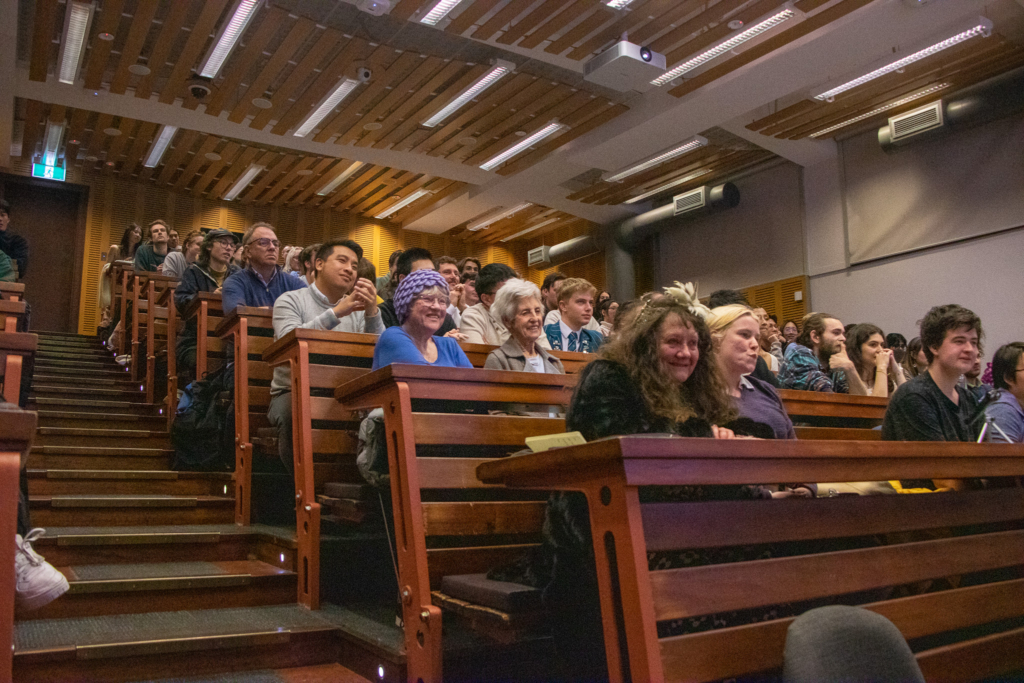
Chlöe Swarbrick: “Under the Residential Tenancy Act, section five excludes student accommodation from complying with any of the standards that we have in the RTA. That is a big problem when it comes to the quality of housing, but also with the likes of rent controls, which already exist within the RTA, preventing price increases from occurring more than once per annum.
In the midst of the first Covid lockdown, I heard from a number of students across the country crying out, particularly from Vic Uni, about being charged when they had to leave their student accommodation after being given just 48 to 72 hours notice. That opened the Pandora’s box for realising just how unregulated the student accommodation market is, to the extent that we’ve seen ads, particularly in the Australian market, for people to buy student accommodation units in New Zealand promising a guaranteed return on investment. You can’t do that officially, but you can when you know that you have a captured market.
That’s the problem. We do not have meaningfully regulated student accommodation in this country. It’s been left to the private market, where we’re increasingly seeing tertiary education providers who don’t have enough capital investment farming it out to third parties, who are obviously interested in making a profit. There was a proposal for regulation in what’s now called the Student Accommodation Inquiry, which I spearheaded through the Educational Workforce Select Committee. We were the only party who was championing that regulation. The rest of them said leave it to the market.”
Mahesh Muralidhar: “The best year of my life was in O’Rorke. I actually walked out of university with an 80,000 student loan and I had to work really hard to pay it back. I know the pain. I know how hard it is. We need to make sure that parts of student accommodation are regulated.
That is the difference between the National Party and the Act Party. We do believe that at certain points, interventions are required, and intervention in the education sector is absolutely required. We also need to make sure that our universities are incredibly well funded. The key to doing that right now is to make sure international students come back to New Zealand in droves.”
Audience Member: “I study urban planning and I’m really worried about the future climate in our cities. I think the roads you’re going to build will make this much worse. Who’s going to pay for the damage of the floods and droughts we’re going to face in the future? If you say that you have money for roads and no money for public transport, who’s going to pay for these future damages?
Mahesh Muralidhar: “Nobody’s saying that we don’t have money for public transport. We absolutely do. The City Rail Link is a key public transport initiative that National instigated and will make sure is delivered on time, on schedule and well-scoped.
You also need to look at how arteries work in regards to buses, but we need pragmatic solutions. If we just move forward with pure ideology, we end up wasting money and people end up suffering more. Roads are critical because you need EVs and buses to travel on it. There are pragmatic steps that need to be taken.”
Closing
Damien Venuto: “Thank you to everyone who came. I really appreciate it and thank you to all the candidates for sharing their thoughts and ideas. Hope you all enjoyed the evening.”



